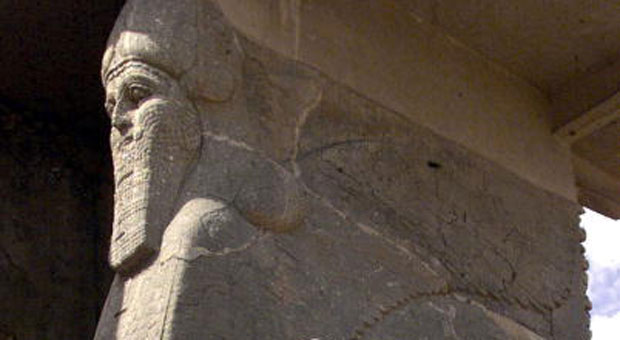Islamic State fighters 'bulldoze' ancient Iraqi city
Militants raided the historical city in their latest attack on the 'non-Islamic heritage' of the Middle East

A free daily email with the biggest news stories of the day – and the best features from TheWeek.com
You are now subscribed
Your newsletter sign-up was successful
Islamic State fighters have looted and "bulldozed" the ancient Assyrian city of Nimrud, according to the Iraqi government.
"They came at midday with a bulldozer and started destroying the palace," an official told Al Jazeera.
Nimrud, founded in the 13th century BC on the banks of the river Tigris, is one of the most celebrated cultural heritage sites in the country.
The Week
Escape your echo chamber. Get the facts behind the news, plus analysis from multiple perspectives.

Sign up for The Week's Free Newsletters
From our morning news briefing to a weekly Good News Newsletter, get the best of The Week delivered directly to your inbox.
From our morning news briefing to a weekly Good News Newsletter, get the best of The Week delivered directly to your inbox.
Iraq's Ministry of Tourism and Antiquities has condemned the destruction, saying that IS continues "to defy the will of the world and the feelings of humanity."
IS fighters reportedly used heavy machinery and military vehicles to remove ancient statues from the site in the latest attack on Iraq's cultural centres.
"They are erasing our history," Iraqi archaeologist Lamia al-Gailani told the BBC.
IS has previously said statues are "false idols" put on display by "devil worshippers" and must be destroyed.
A free daily email with the biggest news stories of the day – and the best features from TheWeek.com
This comes less than week after IS militants were filmed using sledgehammers to destroy statues and artefacts in the ancient site of Nineveh in Mosul. The UN has since condemned the attack as a war crime.
"These ruins behind me are idols and statues that people used to worship in the past instead of Allah," said one man in the video. "God created us to worship him, him only – not some stones."
IS also reportedly burnt down Mosul Library, which housed more than 8,000 ancient manuscripts, according to the BBC.
The latest destruction "signals a new phase in [Islamic State's] declared war on the non-Islamic heritage of the Middle East, both human and historical," says The Times.
Mosul and nearby areas have been under IS control since June last year. This occupied region holds 1,800 of the country's 12,000 registered archaeological sites. Hatra, a nearby World Heritage Site, is feared to be next.
-
 Judge blocks Trump suit for Michigan voter rolls
Judge blocks Trump suit for Michigan voter rollsSpeed Read A Trump-appointed federal judge rejected the administration’s demand for voters’ personal data
-
 US to send 200 troops to Nigeria to train army
US to send 200 troops to Nigeria to train armySpeed Read Trump has accused the West African government of failing to protect Christians from terrorist attacks
-
 Grand jury rejects charging 6 Democrats for ‘orders’ video
Grand jury rejects charging 6 Democrats for ‘orders’ videoSpeed Read The jury refused to indict Democratic lawmakers for a video in which they urged military members to resist illegal orders
-
 Epstein files topple law CEO, roil UK government
Epstein files topple law CEO, roil UK governmentSpeed Read Peter Mandelson, Britain’s former ambassador to the US, is caught up in the scandal
-
 Iran and US prepare to meet after skirmishes
Iran and US prepare to meet after skirmishesSpeed Read The incident comes amid heightened tensions in the Middle East
-
 Israel retrieves final hostage’s body from Gaza
Israel retrieves final hostage’s body from GazaSpeed Read The 24-year-old police officer was killed during the initial Hamas attack
-
 China’s Xi targets top general in growing purge
China’s Xi targets top general in growing purgeSpeed Read Zhang Youxia is being investigated over ‘grave violations’ of the law
-
 Panama and Canada are negotiating over a crucial copper mine
Panama and Canada are negotiating over a crucial copper mineIn the Spotlight Panama is set to make a final decision on the mine this summer
-
 Why Greenland’s natural resources are nearly impossible to mine
Why Greenland’s natural resources are nearly impossible to mineThe Explainer The country’s natural landscape makes the task extremely difficult
-
 Iran cuts internet as protests escalate
Iran cuts internet as protests escalateSpeed Reada Government buildings across the country have been set on fire
-
 US nabs ‘shadow’ tanker claimed by Russia
US nabs ‘shadow’ tanker claimed by RussiaSpeed Read The ship was one of two vessels seized by the US military